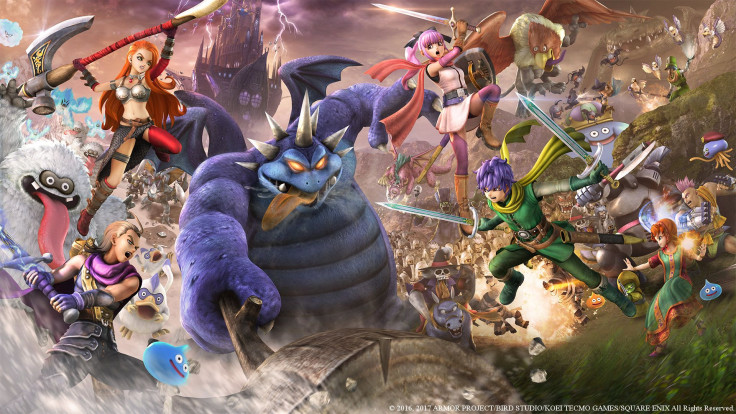It isn’t often we see noteworthy spin-offs of long-established franchises. But Dragon Quest Heroes didn’t just convince a new generation to pay attention to an oft-ignored cornerstone of the RPG genre. It’s given Square Enix a new way to market the deep roster of characters from the Dragon Quest series without releasing reboots or HD remasters. And the next addition to the Heroes lineage, Dragon Quest Heroes 2, is every bit as exceptional as its predecessor.
Dragon Quest Heroes 2 features many of the same systems and mechanics from the Dragon Quest RPGs. Players still manage a party of warriors and casters. There’s new equipment to purchase and increasingly powerful spells to master. You’ll guide a party of four in combat, swapping between each as needed or desired. Tension is back. And there are plenty of side quests to complete throughout the campaign. But if you were to trying to place the series on a spectrum, with hack-and-slash on one pole and role-playing games atop the other, Dragon Quest Heroes falls somewhere between action-RPGs and musou games, like Dynasty Warriors.
There are key differences between Dragon Quest Heroes and the musou genre, the most obvious being that players can’t choose which army to fight for. Commanding officers don’t roam the battlefield in DQH either. Players encounter the occasional mini-boss, along with elite mobs in Wild Zones, but Dragon Quest Heroes 2 still relies on traditional boss encounters. Major foes have their own stages, so players don’t have to repeat an entire battle if they die, and boss fights are the closest thing to a formal chapter ending we see in DQH2. Dragon Quest Heroes 2 also does that annoying thing where soon-to-be party members are used as pseudo-bosses before the game slots a drastically weaker version of the character into your team. But most of the big fights are more enjoyable and less grind-y than boss battles from the first Heroes.
The campaign in Dragon Quest Heroes 2 also feels much more akin to something we’d see in a traditional action-RPG. One of our biggest beefs with the first game was how frequently Dragon Quest Heroes sent players back to the stage selection screen. Encounters were short, provided relatively little experience and it sometimes felt like we were spending as much time browsing menus as we were fighting monsters. Stages are still pretty short in DQH2 and can usually be completed in 20-30 minutes. But missions are now arranged in sets, each featuring one or two objectives, making it easy to transition from one scenario to the next. Players are also given a chance to manage the party’s skills and equipment between fights. They can also head back to town to buy supplies or grab new side quests. You can also explore Wild Zones, large open areas reminiscent of Destiny ’s patrol maps, where you can grind out extra experience, save imperiled villagers (for extra XP) or collect crafting materials.
Dragon Quest Heroes 2 isn’t a complete departure from traditional musou gaming. Dozens (sometimes hundreds) of enemies will crowd the party at every opportunity. Hit combo totals regularly stretch into the hundreds and the action can be rather eye-catching once casters start throwing spells around. Combat is a bit deeper in DQH2 than its predecessor, but those who’d rather just experience the story can still activate a simplified control system that encourages players to mash the light and heavy attack buttons indiscriminately. Omega Force also incorporated some modern elements, like a loot system that favors certain drops (like extra gold or rare items) on specific days of the week. I’m also a fan of the decision to create one-off stories for each new addition to the Heroes series, mirroring the self-contained stories from the Dragon Quest RPGs. And there’s a much broader assortment of enemies to see this time around.
The game isn’t perfect. Not that any five-star game ever really is. But there are some issues with Dragon Quest Heroes that make our highest rating feel a bit unreasonable. Movement still feels sluggish in DQH both in and out of combat, and a poorly-implemented camera lock that doesn’t automatically direct attacks toward the chosen target, frequently leaves members of your party stabbing at open air. It’s particularly frustrating when your Coup de Grace, the high-impact finishing spell triggered at the end of High Tension mode, whiffs during a boss fight. It’s hardly the worst oversight we’ve ever stumbled upon, but it remains a thorn in the player’s side throughout the Dragon Quest Heroes 2 campaign. DQH2 is also the latest project to commit my own personal cardinal sin of gaming: cramming a stealth section into a non-stealth game. And the party’s skill trees still feel too similar to one another to be interesting.
Dragon Quest Heroes 2 continues building upon the foundation laid by the first Heroes without sacrificing its RPG influences or radically transforming the hack-and-slash gameplay that sets it apart from previous Dragon Quest releases. There’s still room for improvement, particularly with regard to the game’s cookie-cutter, prophecy-focused story. But Dragon Quest Heroes still feels like the perfect franchise for those of incapable of “turning off” enough portions of their brain to enjoy Dynasty Warriors . There are enough RPG mechanics baked in to scratch that itch without getting too bogged down in minutiae to lose its status as a podcast game. If you enjoyed the first Dragon Quest Heroes , there’s little reason to believe you won’t love the sequel too.
Dragon Quest Heroes 2 is currently available on PS4 and Nintendo Switch.
Be sure to check back with iDigitalTimes and follow Scott on Twitter for additional Dragon Quest Heroes 2 news in 2017 and however long Square Enix supports Dragon Quest Heroes 2.


















